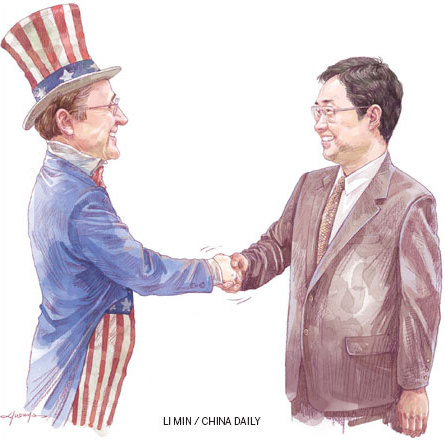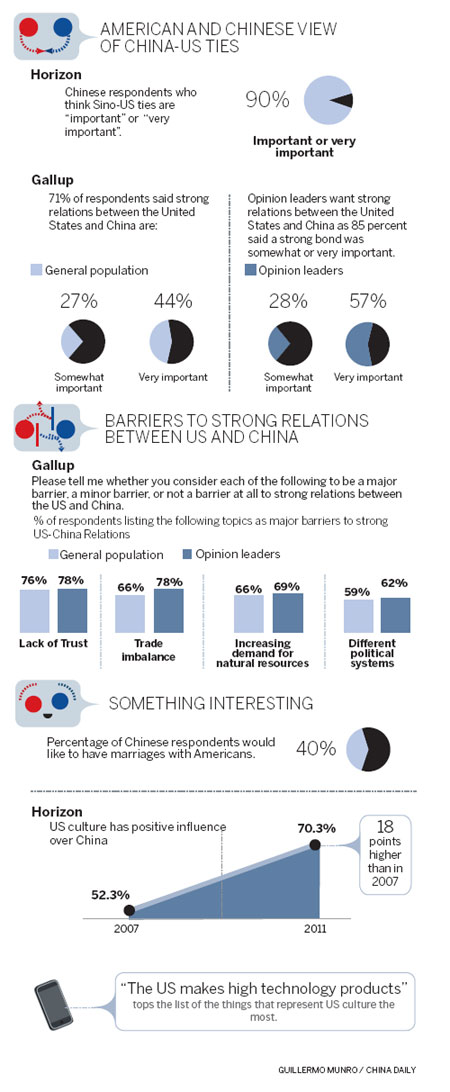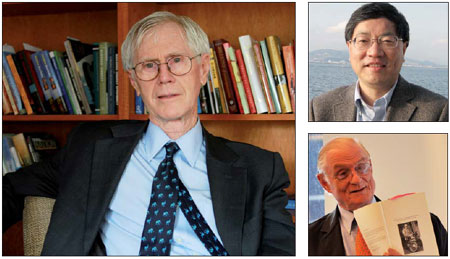Matter of perception
Updated: 2012-02-10 09:34
By Chen Weihua (China Daily)
|
||||||||

Better, stronger relations between china and US, but major hurdles remain
When Chinese Vice-President Xi Jinping meets US President Barack Obama in the White House on Feb 14, Valentine's Day, the date may just be appropriate.
| ||||
Ties between the two nations have over the years changed from one of hostility and no-contact, before former US president Richard Nixon's historic trip to China 40 years ago, to one that is now more intertwined and interdependent.
But at the same time, thorny issues do exist in this mature and complex relationship, especially after China's rapid rise and the relative decline of US in recent years. However, both sides have demonstrated a strong willingness to work together to expand common interests and minimize differences.
The above picture sums up the findings of the latest China Daily/Gallup poll, which indicates that a majority of the Americans want strong bilateral relations.
More than 70 percent of respondents felt that strong bilateral relations are somewhat or very important. Opinion leaders are even more supportive with 85 percent of them in favor of strong relations between the two countries. The survey covered 2,007 Americans and 250 opinion leaders and was conducted in December, while the findings were released recently.
According to the survey, Americans want more cooperation between the two countries in economic and energy issues, and also in sectors such as culture, education, science, politics and diplomacy.
Another survey conducted by China Daily and Beijing-based research company Horizon shows that more than 90 percent of the Chinese public believe the Sino-US relationship is important.
The polling was done among about 1,500 people in Beijing, Shanghai, Guangzhou, Wuhan, Chengdu, Shenyang and Xi'an, most of which host US diplomatic missions.
About half of the respondents believe the Sino-US relationship is "very" important, an increase of 20 percent from the result of 2010.
Almost 60 percent of Chinese respondents think the bilateral relationship will stay stable in general and nearly one-fourth believe it will become better.
"China has become more important to the United States economically. Most people have been forced to learn more about it because they view their future as one that is increasingly dependent on China," says Orville Schell, the Arthur Ross Director of the Center on US-China Relations at the New York-based Asia Society.
The China Daily/Gallup survey also finds that Americans are split in their views of China. Forty-two percent of Americans and 49 percent opinion leaders have a favorable view of China while 44 percent of the public and 40 percent of opinion leaders hold an unfavorable view. The rest of the respondents were undecided.
Compared with the Gallup polls on the same topic in previous few years, the percentage of respondents with a favorable view remains pretty much the same, while the ratio of unfavorable views has gone down. The number of undecided respondents has, however, increased.
Nearly 13 percent of Americans consider China as an ally, while 63 percent regard China as friendly but not an ally. Among opinion leaders, 6 percent consider China an ally while 69 percent believe it is friendly but not an ally. Almost 60 percent of the Council on Foreign Relations (CFR) members who had participated in a Pew Center survey conducted in late 2009 had admitted that China would be an ally of the US in the future. Not surprisingly, the Chinese ranking was far higher than the ranks bagged by the US allies in Asia and Europe.
"I am glad to see that most Americans are in favor of friendly ties with China, considering that both nations have neither a formal alliance nor alliances," says Jerome Cohen, a law professor at New York University (NYU) and a leading Western scholar on China's legal system.
"China is certainly not an enemy of the United States and the US is not an enemy of China. But there are some people in both nations who think that the two countries are enemies or will become enemies. They are a minority. It is for the rest of us to prove that they are wrong," says Cohen.
A former professor at the Harvard Law School, Cohen was among the group of American scholars including Harvard sinologist John Fairbank who had advocated establishing ties much ahead of US president Richard Nixon's historic visit to China 40 years ago.
However, the China Daily/Horizon survey shows "the hegemony by the US on other countries" has become a major factor affecting Chinese citizens' impression toward the US.
About 40 percent of respondents says the US war on terror, even after Osama bin Laden was killed in May 2011, made their impression of the US worse, which is an increase of 8 percentage points from the result in 2007 in the midst of the war.
Almost 65 percent respondents said their impression on the US has been worsened over the US intervention in Syria and Libya.
Historic view
It is not surprising that there are divergent views among the US populace on ties with China. Right from the beginning, the American perception on China has been divided between "acceptance and rejection, admiration and contempt", says Terry Lautz, a visiting professor at Syracuse University and former vice-president of the Henry Luce Foundation.
Earlier Americans tended to look at China's rich history and culture with great fascination, but they also treated a weak and disorganized China with much disdain, he says.
"The notion that China ought to be just like the US was especially nourished by several generations of American missionaries who had vested interests in creating ties that would bind the two cultures together," Lautz said at a recent seminar in Washington.
Many Americans in those days viewed China as the victim of warlords, famine and revolution. They believed China was actively looking for change and Americans were willing to oblige through the gifts of democracy, science, capitalism and Christianity, according to Lautz.
However, American perceptions of China started changing after 1949 following the founding of the People's Republic. The two countries fought a bitter war in Korea during the early 1950s. The Vietnam War in which China backed Vietnam and decades of the Cold War created only animosity and distrust in public perception. To some extent, some of that distrust from the Cold War era is still present.
Causes for concern
China's reform and opening-up during the late 1970s reignited American interest in China, and attracted many Americans to teach and invest in the country. But public perception of China continued to be volatile and subject to the influence of various incidents between the two countries.
Since then the Americans have watched in awe the splendid opening ceremonies of the Beijing Olympics in 2008 and the Shanghai World Expo in 2010. China's fast growing economic and military strength, soft power and global outreach have evoked mixed sentiments among Americans.
From accounting for less than 2 percent of the global economy in 1990, China now accounts for more than 8 percent, and is the second -largest economy in the world, after the US. All predictions show that the Chinese economy will surpass that of the US in the next decade or so.
Despite the fact that US President Barack Obama and other leaders have publicly welcomed China's rise, high unemployment, huge national debt and government deficit has fanned anti-China rhetoric, especially in the US Congress.
According to the China Daily/Gallup survey, Americans are divided on the implications of China's expanding economy. Nearly 45 percent of the general public say it is a good thing, while 48 percent consider it bad. Opinion leaders are more positive on the issue with 61 percent admitting China's growth is a good thing for the US.
However, when asked whether China's growing influence in the world is a good thing or a bad thing, only 32 percent of the general population and 28 percent of opinion leaders say it is a good thing. Nearly 42 percent of all respondents and 44 percent of the opinion leaders were of the view that China would soon replace the US as the world's leading power.
On the national security front, 51 percent of the general public and 60 percent of opinion leaders agree that China's increasing military strength is a threat to US national security. In the Pew survey of December 2009, only 21 percent of the CFR members considered China's rise as a global power, a threat to the US.
According to the China Daily/Gallup survey, 20 percent of respondents say they do not know enough about China's currency issue to determine whether it is a major contributing factor for the US economic situation. Still, 42 percent of the general public and 47 percent of opinion leaders consider it a major issue.
Noting that the US is still the most powerful country in the world, Schell points out that the US has undergone a series of failures and become more self-indulging, such as the failures in Afghanistan or Iraq and the financial crisis. The setbacks have made Americans worried and uncertain, and also project unrealistically the power on the Chinese side.
"Some Americans think China's economy is already larger than the US. It is wrong," says John Copper, the Stanley Buckman professor of International Studies at Rhodes College in Memphis, Tennessee.
Copper believes there is jealousy among Americans about China's remarkable growth. "The general public in the US is worried about the relative decline of America. The US is used to being the No 1 nation in the world and China's rapid rise is seen as a challenge," he says.
Schell believes that there are two factors that are largely responsible for the negative views on China.
"The economic system in China and the US is vastly different and there is hardly anything like the State-owned sector in the US. The political systems in the two nations are also vastly different, thereby stirring up a lot of anti-communist tirade in the United States."
Shen Dingli, director of the Center for American Studies at Fudan University in Shanghai, says that China's rapid growth, many times faster than that of the US, would naturally make Americans and many other nations uneasy.
"Which country will be happy to see China, once so far behind, develop 10 times faster than their own countries?" Shen says.
But Shen points out that China's mixed economic pattern and development model has also been a source for concern. He cites the drastic depletion of natural resources and the environmental degradation that happened in China over a short period of three decades as something unimaginable in other countries.
Better ties
In the eyes of Nick Platt, an American diplomat who went with Nixon on the legendary China trip, the relationship between China and the US has improved by leaps and bounds. "If Nixon were alive, he would be astonished to see how big and successful the relationship has become. He would be perfectly happy with it too," says Platt, who served in the US liaison office in Beijing during the mid-1970s and also as the former president of the Asia Society.
But he cautions that the relationship is not friction-free. "The bigger the relationship is, the closer the countries are, the more are the frictions they will have," Platt says.
On various occasions, former US secretary of state Henry Kissinger and former national security advisor Brent Scowcroft have both applauded the US policy on China as the most successful and bipartisan American foreign policy in the last 40 years.
According to the China Daily/Gallup survey, 35 percent of American and 43 percent of opinion leaders believe relations between the two countries have improved in the last decade, while 33 percent of the public and 32 percent of the opinion leaders felt that it has remained at the same levels. About 28 percent of the public and 22 percent of opinion leaders say the relations have declined.
Yet despite a desire for stronger relations, respondents say several barriers impede stronger ties, most notably the lack of trust, trade imbalances, increased demand for natural resources and different political systems.
Cohen from NYU says that generally speaking, China and the US have developed good mutual understanding.
"Trust is a very hard quality to quantify and to confirm the existence of. I think the more we cooperate, the better it will be. Each country should take the lead in moving toward the other," he says.
Schell from the Asia Society believes that considerable progress has been made in overcoming the perceptions of a China threat and that the US is trying to contain China. However, factors such as the tension in the South China Sea do add to such fears.
"While things in Washington tend to get politicized, especially in an election year, China and the US can emphasize more on local cooperation," he says.
"The concrete benefits of Chinese investment and exchanges will help people improve their feeling of China," says Schell, who masterminded a special report last May in conjunction with the Kissinger Institute of the Woodrow Wilson Center, titled An American Open Door? - Maximizing Benefits of Chinese Foreign Direct Investment.
"During the 1980s, Japan had a very bad reputation when they started to buy things in America. Then they moved state by state to build automobile plants and perception quickly changed," says Schell, who recently met California Governor Jerry Brown to discuss Xi's trip to the US, which also includes a stopover in Los Angeles and Muscatine, Iowa.
Public education
While polls have become an indispensable part of American life and politics, Platt says public opinion is not always based on intensive study of a particular problem.
"China needs to understand that by and large there is tremendous ignorance in the US about China. Of course, there is also a lot of ignorance in China about the US," says Schell.
"Our education system and media also have many failures. This creates a lot of room for fear," says Schell, the former journalism dean at the University of California in Berkeley.
"We were ignorant in 1972. We had no contact. Now we have lots of contacts, even though it's not sufficient," says Cohen of NYU.
Like the NYU, which opened its Shanghai campus last year, more American colleges have set up study abroad programs in China.
In a bid to help more Americans understand China, President Obama announced a "100,000 Strong" national initiative in 2009 to increase the number of American students studying in China. The Chinese government also showed its strong support to the move by committing 10,000 "Bridge Scholarships" for American students to study in China.
Schell is not the only American scholar who compares the relationship between the two countries to that of a married couple, sometimes sleeping in the same bed but dreaming different dreams.
"Though China and the US disagree with each other on many things, the reality is that divorce is not an option," he says.
Schell and other experts agree that Vice-President Xi's trip to the US would be an important step in improving the relationship.
"The visit by Vice-President Xi is very important. I think Americans are really eager to know who he is, to have a sense of him and (know) what his views are on many questions," says Cohen.
Cheng Guangjin in Beijing contributed to this story.

|
Clockwise from above: Orville Schell is the Arthur Ross Director of the Center on US-China Relations at the New York-based Asia Society; Shen Dingli is director of the Center for American Studies at Fudan University in Shanghai; and Nick Platt was an American diplomat who went with Nixon on the legendary China trip. Photos Provided to China Daily |

 Relief reaches isolated village
Relief reaches isolated village
 Rainfall poses new threats to quake-hit region
Rainfall poses new threats to quake-hit region
 Funerals begin for Boston bombing victims
Funerals begin for Boston bombing victims
 Quake takeaway from China's Air Force
Quake takeaway from China's Air Force
 Obama celebrates young inventors at science fair
Obama celebrates young inventors at science fair
 Earth Day marked around the world
Earth Day marked around the world
 Volunteer team helping students find sense of normalcy
Volunteer team helping students find sense of normalcy
 Ethnic groups quick to join rescue efforts
Ethnic groups quick to join rescue efforts
Most Viewed
Editor's Picks

|

|

|

|

|

|
Today's Top News
Chinese fleet drives out Japan's boats from Diaoyu
Health new priority for quake zone
Inspired by Guan, more Chinese pick up golf
Russia criticizes US reports on human rights
China, ROK criticize visits to shrine
Sino-US shared interests emphasized
China 'aims to share its dream with world'
Chinese president appoints 5 new ambassadors
US Weekly

|

|

 Two Views
Two Views 






